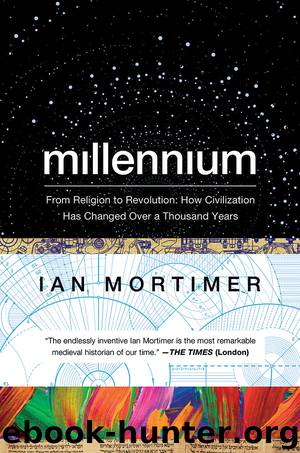Millennium: From Religion to Revolution: How Civilization Has Changed Over a Thousand Years by Ian Mortimer

Author:Ian Mortimer [Mortimer, Ian]
Language: eng
Format: epub
Tags: History
ISBN: 9781681772431
Amazon: 1536668761
Barnesnoble: 1536668761
Goodreads: 28943770
Publisher: Pegasus Books
Published: 2016-11-08T08:00:00+00:00
Enlightenment liberalism
Immanuel Kant described the Enlightenment as the ability to think for oneself, free from convention and dogma. Given such a broad definition, it is hardly surprising that it has been treated as an enormously elastic term. It is frequently taken to be a synonym for all the changes that distinguish the breezy, elegant world of Jane Austen’s novels from the dark depths of the witch-burning seventeenth century. It is an intellectual bucket into which scientific concepts and rationalist theories are idly tossed, along with the rise of political economy and the decline of superstition. In that general sense, the Enlightenment started with Francis Bacon and Galileo in the early seventeenth century, incorporated the Scientific Revolution in its entirety, and did not come to an end until after the fall of Napoleon in 1815. This clearly is too vague a definition and too long a time span. For the purposes of this book, therefore, two intellectual changes frequently treated as elements of the Enlightenment are here dealt with separately: liberalism and economic theory.
At the heart of the Enlightenment was the 28-volume Encyclopédie, edited in Paris by Denis Diderot andJean-Baptiste le Rond d’Alembert. This work, which was in the press for nearly twenty years (1752–71), was like an eternal flame around which the butterflies of genius fluttered – among them Montesquieu, Voltaire, Jean-Jacques Rousseau, Turgot and Louis de Jaucourt (who wrote a quarter of the Encyclopédie single-handedly). But the whole project was much more than the sum of its parts: it was an attempt to realign mankind’s relationship with the natural world exclusively along the lines of reason, without recourse to magic, superstition or religion. Dividing all knowledge into three branches – memory, reason and the imagination – the editors created a taxonomy that left no room for matters such as divine will or spiritual intercession. Their purpose can be summed up in the single thematic heading to which they subjected the entire work: understanding.
Underpinning the ambitions of the editors and contributors was a self-perpetuating concept of social progress. Turgot explained this in his Philosophical Review of the Successive Advances of the Human Mind in 1750. He started off with the premise of deism: that God was the ‘prime-mover’ of the universe – a concept that Thomas Aquinas had originally offered in the thirteenth century as part of his proof for God’s existence. In the language of the Enlightenment, God was the great clockmaker who had simply set the world going and then left it alone. Slowly humanity had emerged from its state of nature and passed through three stages – hunter-gatherer, pastoral and agricultural – until finally arriving at the fourth and final stage, the commercial. Along the way, the ability to generate ever greater agricultural and manufacturing surpluses had facilitated the transition from one stage to the next. For Turgot, the evidence that this was indeed ‘progress’ lay in the fact that mankind was constantly adding to the existing body of knowledge. Thus humanity would continue to advance forever more, he reasoned, on account of it being in our nature to enquire into things.
Download
This site does not store any files on its server. We only index and link to content provided by other sites. Please contact the content providers to delete copyright contents if any and email us, we'll remove relevant links or contents immediately.
Learning SQL by Alan Beaulieu(6290)
Weapons of Math Destruction by Cathy O'Neil(6279)
Digital Minimalism by Cal Newport;(5764)
iGen by Jean M. Twenge(5415)
Sapiens by Yuval Noah Harari(5370)
The Age of Surveillance Capitalism by Shoshana Zuboff(4292)
Elon Musk by Ashlee Vance(4127)
Thing Explainer by Randall Munroe(3939)
Apollo 8 by Jeffrey Kluger(3708)
Future Crimes by Marc Goodman(3600)
The Science Book (Big Ideas Simply Explained) by DK(3286)
The Innovators: How a Group of Hackers, Geniuses, and Geeks Created the Digital Revolution by Walter Isaacson(3208)
Who Can You Trust? by Rachel Botsman(3133)
I Live in the Future & Here's How It Works by Nick Bilton(2997)
Infinite Energy Technologies by Finley Eversole(2984)
Steve Jobs by Walter Isaacson(2899)
Dawn of the New Everything by Jaron Lanier(2771)
Chernobyl by Serhii Plokhy(2538)
Ben Franklin's Almanac by Candace Fleming(2531)
